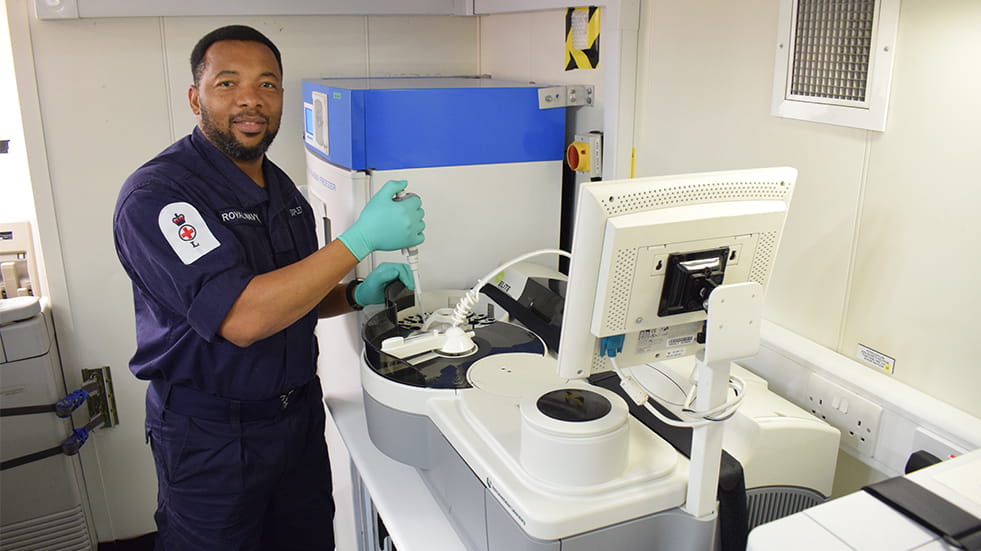Biomedical Scientist
Provide a clinical laboratory service including blood products, to support the delivery of enhanced medical care to our patients wherever you are in the world.
- £30,000 - £52,000
- Undergraduate Degree
- Surface Fleet
- Medical
- Rating level
6 weeks
BSc
£33,000
Free
£48,000
Travel

I’m multi-disciplinary, which means I get really varied work, whether I’m on board ship, or in an NHS hospital.
Role details
What you’ll do
Saving lives. It’s what your job will be all about. Helping care for survivors at the scene of a natural disaster. On rotation in an NHS hospital. Conducting blood transfusions in conflict zones where trauma patients need lifesaving treatment. Wherever you are, and whatever you’re up against, as a Royal Navy Biomedical Scientist you’ll support our medical teams with an essential clinical laboratory service. You’ll help ensure the wellbeing of our people, and will be crucial to the success of every operation.
Your role
- Practise all the major laboratory disciplines, whether you’re in a hospital in Birmingham, or on board a ship off the coast of Bahrain
- Play a key role in supporting deployed personnel as well as those stationed in the UK
- Be multi-disciplined, taking on a variety of duties rather than being restricted to a particular specialism.
- Be part of a world-class medical service that’s respected far beyond the Armed Forces
Pay & benefits
- A salary that rises to at least £33,000 as soon as you finish training
- Earn in excess of £52,000 as your career progresses
- An excellent pension scheme
- Six weeks of paid holiday every year
- Free medical and dental care
Skills for life
Qualifications you'll gain
- Multi-disciplinary laboratory skills
- An opportunity to study further at Degree level 6 and Masters level 7 to top up your professional portfolio
Skills you'll develop
- How to support medical teams with clinical lab service, wherever they are in the world
- Experience every laboratory discipline, and develop throughout your career
Eligibility
- Aged 20 to 39
- A degree in Biomedical Science
- Membership of the Health & Care Professionals Council (HCPC)
- IBMS accredited degree in Biomedical Sciences
- Non-accredited IBMS degrees will be considered; check with MSAT PO
- You must be a British or Irish national, a Commonwealth citizen, or a Dual National
- A Body Mass Index (BMI) between 18 and 28 (between 17 and 27 if under 18)
Skills & interests
- A high level of clinical skill
- A caring and compassionate nature
- A passion for helping people
- Be highly organised, and calm under pressure
- A sense of adventure
Joining process
From picking your role to starting on your first day, these are the steps you'll take to join as a rating.
Submit an application
Defence Aptitude Assessment (DAA)
You’ll be tested on: Verbal Reasoning, Numerical Reasoning, Work Rate, Spatial Reasoning, Electrical Comprehension and Mechanical Comprehension.
To prepare, you can practice the DAA
Interview
Candidate Preparation Course (CPC)
Start training
Career progression
Got a question?
Our virtual recruiter is available to answer your questions 24 hours a day
